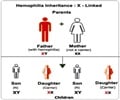Certain blood thinners approved to treat atrial fibrillation may put patients with chronic kidney disease (CKD) at a higher risk of bleeding.

‘New study findings suggest the need for caution in prescribing direct oral anticoagulants in patients with CKD.’





Given that approximately one-quarter of patients with atrial fibrillation have CKD, the real-world safety and effectiveness of direct oral anticoagulants in patients with atrial fibrillation across the spectrum of kidney function is of great public health importance. To investigate, Jung-Im Shin, MD, PhD (Johns Hopkins University) and her colleagues examined 2010-2017 information from the electronic health records of 3206 patients with atrial fibrillation who used direct oral anticoagulants and similar 3206 patients with atrial fibrillation who used the conventional anticoagulant warfarin. There were 1181 bleeding events and 466 ischemic strokes over 7391 person-years of follow-up. (A person-year is the number of years of follow-up multiplied by the number of people in the study.) In patients without CKD, the risk of bleeding and benefits of preventing ischemic stroke between direct oral anticoagulant and warfarin use were similar. On the other hand, patients with CKD who took direct oral anticoagulants had 23% higher risk of bleeding compared with those on warfarin, but similar benefits from prevention of ischemic stroke.
"Despite sparse evidence in safety and effectiveness of direct oral anticoagulants in CKD, we saw that prescription of direct oral anticoagulants in the CKD population increased substantially over time. We also found that direct oral anticoagulant use was linked with a higher risk of bleeding compared to warfarin use in patients with CKD." said Dr. Shin.
Study co-authors include Alex Secora, MPH, G. Caleb Alexander, MD, MS, Lesley A. Inker, MD, MS, Josef Coresh, MD, PhD, Alex R. Chang, MD, MS, and Morgan E. Grams, MD, PhD.
Disclosures: G.C.A. is Chair of the US Food and Drug Administration's Peripheral and Central Nervous System Advisory Committee; has served as a paid consultant to IQVIA and serves on the Advisory Board of MesaRx Innovations; holds equity in Monument Analytics, a health care consultancy whose clients include the life sciences industry as well as plaintiffs in opioid litigation; and serves as a member of OptumRx's Pharmacy and Therapeutics Committee. This arrangement has been reviewed and approved by the Johns Hopkins Bloomberg School of Public Health.
Advertisement















